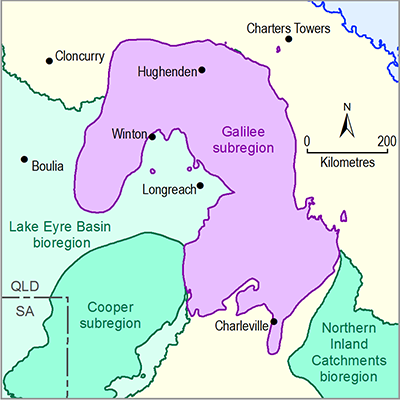The next four sections in this product (Section 2.7.3 to Section 2.7.6, inclusive) focus on the five landscape groups that are considered during subsequent stages of the bioregional assessment (BA) for the Galilee subregion. The purpose of the current section is to provide the rationale for the choice of landscape groups that have been selected for the impact and risk analysis, and to describe the modelling undertaken for each of these groups.
The landscape classification for the assessment extent of the Galilee subregion identified 31 landscape classes that were aggregated into 11 broad landscape groups (see Section 2.3.3 of companion product 2.3 for the Galilee subregion (Evans et al., 2018)). Once the zone of potential hydrological change was developed for the Galilee subregion (as outlined in companion product 3‑4 (Lewis et al., 2018)) it was used to (i) identify ecological landscape classes (and the aggregated landscape group) that intersect it and are potentially impacted by the modelled hydrological changes due to additional coal resource development, and (ii) rule out landscape classes that do not intersect the zone and are therefore considered very unlikely (less than 5% chance) to be impacted by changes in hydrology. Qualitative mathematical models and receptor impact models were developed only for those landscape groups that are potentially impacted (i.e. occur within the zone of potential hydrological change).

Product Finalisation date
- 2.7.1 Methods
- 2.7.2 Overview
- 2.7.2.1 Introduction
- 2.7.2.2 Potentially impacted landscape groups
- 2.7.2.3 'Springs' landscape group
- 2.7.2.4 Streams landscape groups
- 2.7.2.5 'Floodplain, terrestrial GDE' landscape group
- 2.7.2.6 'Non-floodplain, terrestrial GDE' landscape group
- 2.7.2.7 Outline of content in the following landscape group sections
- References
- Datasets
- 2.7.3 'Springs' landscape group
- 2.7.4 Streams landscape groups
- 2.7.5 'Floodplain, terrestrial groundwater-dependent ecosystem' landscape group
- 2.7.6 'Non-floodplain, terrestrial groundwater-dependent ecosystem' landscape group
- 2.7.7 Limitations and gaps
- Citation
- Acknowledgements
- Contributors to the Technical Programme
- About this technical product
